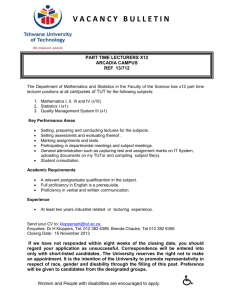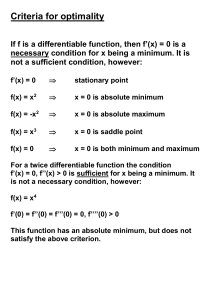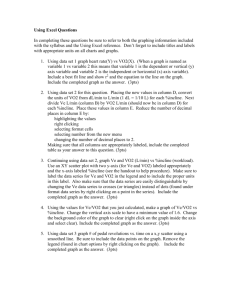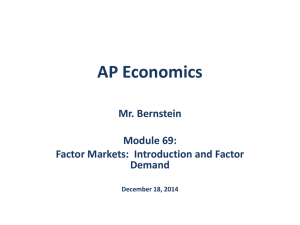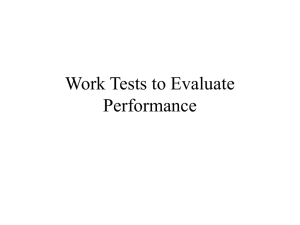FEB 1998 ASC X12 TRIMESTER MEETING
advertisement
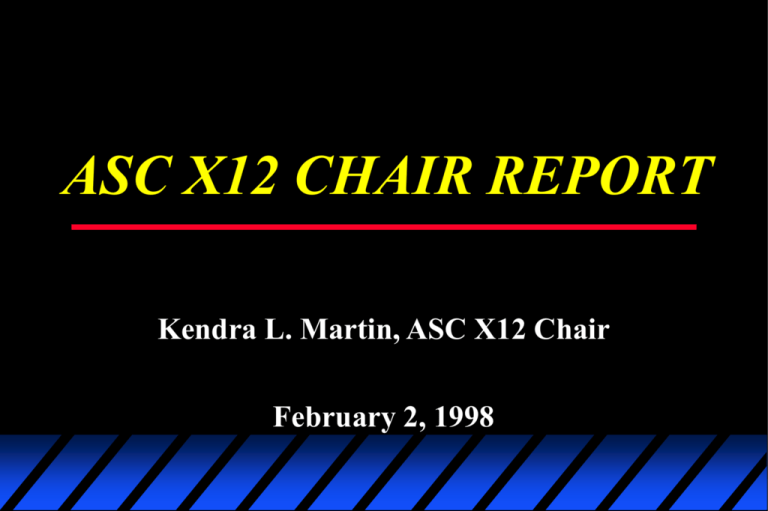
ASC X12 CHAIR REPORT Kendra L. Martin, ASC X12 Chair February 2, 1998 X12 Membership Remains Steady 1000 800 842 838 FY 95 FY 96 848 782 728 600 FY 93 FY 94 FY 97 General Industry Types Comprising X12 Membership Transportation Banking & Financial 6% 5% Computer 5% Insurance 21% Healthcare Service Industry 7% 2% Trade & Nonprofit Association 8% Government 8% Software 11% Consulting 9% Other 5% Manufacturing 13% X12 Publications Net Revenue Grows $800,000 $700,000 $682,900 FY 97 FY 98 $564,000 $600,000 $500,000 $624,400 $424,800 $474,000 $464,000 $400,000 $300,000 $200,000 $100,000 $0 FY 93 FY 94 FY 95 FY 96 Projected X12 Meeting Attendance 1200 1036 934 1000 831 930 901 899 828 800 875 800 792 600 400 200 0 Feb-95 Jun-95 Oct-95 Feb-96 Jun-96 Oct-96 Feb-97 Jun-97 Oct-97 Feb-98 projected X12 Draft Standards for Trial Use Published in Annual Release 350 300 232 250 200 256 273 1995 1996 295 195 150 100 50 0 1993 1994 1997 UN/EDIFACT Messages 10 Accounting, Auditing, Reg. & Financial Info Serv. Arch., Eng. & Construct. 13 Customs 10 Directory Support Services 7 Finance 41 22 Healthcare Insurance 53 Material Management 13 Product Quality Data 9 Purchasing 27 42 Social Security, Employment & Education Statistics 16 Transportation 54 Travel, Tourism & Leisure 27 Other 6 0 10 20 30 40 50 60 X12 Data Maintenance Requests Processed 800 700 747 639 589 600 501 500 375 400 300 200 100 0 FY 94 FY 95 FY 96 FY 97 FY 98 projected Number of Unique Visitors Web Site Activity 12000 10000 8000 10,369 8033 7731 NOV 97 DEC 97 6000 4000 2000 0 JAN 98 KEY 1998 CHALLENGES Strategic Implementation Task Group Global EDI Standards Six-Month Maintenance Cycle SITG OBJECTIVE Make EDI technology widely available, non-obtrusive to the business process, & cost effective for all organizations METRICS: – Well-defined, consistent standards for interoperability – Off-the-shelf, commercially available tools – Separate standards development from application design & programming – Availability of training & reference solutions, e.g., leverage industry efforts – Automatic generation of EDI interactions – Separation of data definition & format from transport layer SITG DELIVERABLES Develop US action plan for implementation of next generation of EDI Develop framework for and ensure design of architecture to support next generation of EDI Develop appropriate bridges from current to future state Ensure there is a single adopted EDI architecture solution for both X12 & international requirements WHAT WE HAVE DONE Formed 2/97 Cleared deck of “history & emotion” Confirmed that change was required Organized to begin work – – – – WG 1 Plan Development WG 2 Education & Awareness WG 3 Technical Development WG 4 Customer Requirements & Metrics Participating in comparable international process – – Developed “Reference Guide” Draft Project Plan DUAL TRACK Any way of doing EDI must permit current & new EDI to exist in parallel Must define a migration path to assist user community in transition NOT talking alignment – But we are talking “convergence” WHAT IS OUR VISION? Implement Open-edi Modeled Approach Object-Oriented Technology The “Shrink Wrap” Solution WHY OPEN-EDI? Opportunity to lower barriers to electronic data exchange by introducing standard business scenarios & services to support them Permits electronic processing of business transactions among autonomous organizations within & across sectors Broadens X12’s scope in the Electronic Commerce playing field BRINGING IT ALL TOGETHER Standards Body for: Business Process Models and Class Libraries WIN WIN Software Providers for: Application Development Expertise Affordable “Plug and Play” Business Solutions for the User Community ISSUES FOR X12 Change will be required Process Roles (users, membership, etc.) Nature of the standards Acceptance of convergence of all EDI standards Level of modeling Rapidity of change Resource implications External relationships Corporate awareness & support “Co-opetition” & liaison with other organizations Outreach SITG & X12 -- NEXT STEPS Approve the “plan” for the Project Plan Technical Work Build pilot for Catalog Order Create business models Create business objects Organizational Work Conduct the analysis Define components for standardization Define organizational structure Training & education in and out of X12 GLOBAL EDI STANDARDS Shift in Focus from EDIFACT Integration to CEFACT Implementation First Empowered “EDIFACT Work Group” Meeting set for 3/98 DLTG and P&P Enhancing OPM and SD6 6-MONTH MAINTENANCE CYCLE Proposal: 2 publication updates each year 2 Full X12 Meetings each year (May & Nov.) - Approve X12 Ballots & Publication Updates 2 Working X12 Meetings each year (Feb. & Aug.) - Review/respond to X12 ballot comments - Optional meetings for Subcommittees WHY DO THIS? X12’s focus continues to shift from pure development to maintenance & implementation. Implications: • Most users don’t need 3 publication cycles/year • Most X12 subgroups don’t need 3 meetings/year Plus: X12’s current 4-month cycle does not align well with EDIFACT Working Group’s 6-month schedule HOW WOULD IT WORK? Mid Feb Early Apr Early May Jun Early Aug Sep Early Nov Jan Change Request Cut-Off TAS Interim Meeting (Assign Change Requests) FULL X12 MEETING (Ballot Package Determined) 45-day X12 Ballot Period X12 Working Meeting (Ballot Comment Response) 30-day Rebuttal Ballot Period or 45-day Reballot Period FULL X12 MEETING (Publication Authorized) Annual Release is Published FULL X12 MEETINGS Who Would Meet? -- Subcommittees -- TAS -- PRB DELIVERABLES: Yes Yes Yes Approved X Approved p WORKING X12 MEETINGS Who Would Meet? -- Subcommittees -- TASYes -- PRB No DELIVERABLES: Optional, ex -- Steering C -- G Ballot comm Rebuttal vs. ADVANTAGES Provides flexible meeting frequency options Reduces # meetings to attend for many people (3 to 2) Reduces elapsed time to approve a complicated change Allows better SC participation in maintenance ballot review Allows better process alignment with EDIFACT Reduces # sub-releases users have to deal with (2 to 1) Reduces administrative costs somewhat DISADVANTAGES Increases number of meetings for some people (3 to 4) Increases elapsed time to approve some new transaction sets Decreases opportunities to publish new standards (3 to 2) Requires some X12 process change PATH FORWARD Feb ‘98 Steering Committee decides whether to authorize an X12 member ballot Feb-Jun X12 Member Ballot Jun ‘98 Steering Committee decides when to implement based on positive ballot result Feb ‘99 Earliest potential start-up of new process THIS WEEK’S AGENDA: Education on Strategic Implementation Task Group activities Input into Procedures for EDIFACT Working Group and SD6 Discussion of Six-Month Publication Cycle Proposal I welcome your on-going input... martink@api.org Tel: (202) 682-8517 Fax: (202) 963-4730
